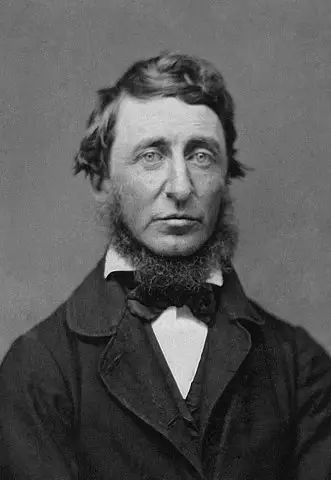Henry David Thoreau
Born: 1817
Birthplace: Massachusetts
Died: 1862
Henry David Thoreau is considered to be one of the most prolific of American poets and writers. His love of nature and the peace that it brings were the topics of many of his poems and books.

Thoreau built a cabin at Walden Pond, where he read and wrote many of his creations. Walden Pond continues to be a historic place in Massachusetts today, honoring Thoreau with poetry readings and art.
- Thoreau was the son of John Thoreau, a local businessman and Cynthia Dunbar, a homemaker, and had three other siblings. He was named David after a family member, but when everyone called him Henry, he decided to change his name.
- By the time Thoreau was sixteen, he was already at Harvard College. Known as an unconventional scholar, he studied Greek and Latin composition and grammar. His interests were varied, and some of his classes included English, mathematics, philosophy, history, and four different languages. He was fascinated with the writings of Ralph Waldo Emerson, who would become his friend and mentor.
- Thoreau graduated in 1837 and went through a bit of time as a tutor and a teacher. It was during an 1839 canoe trip that he decided to give up teaching and become a poet of nature. He began this part of his life by being invited in 1841 to live in the household of the Emerson’s where he assisted in editing and contributing his poetry to the transcendentalist magazine called “The Dial.”
- To continue his poetry, Thoreau decided that he needed personal space. In 1845 he built a small house along the Walden Pond shore and lived there for two years, two months, and two days. He occasionally went to Concord for supplies and to eat with his family every week. Although friends and family visited him, Thoreau was committed to spending as much time as possible writing, reading, and wandering through nature.
- Poets don’t always have a lot of common sense, and when he went into town in 1846 to get his shoes repaired, he was arrested for not paying the tax that supported America’s war in Mexico. He spent one night in jail that he included in his essay that was published in 1849 called “Civil Disobedience.” The essay enforces the type of passive resistance to laws that are unjust. This essay inspired people such as Martin Luther King, Jr, and Gandhi.
- Thoreau’s journal at Walden was the basis for his famous book “Walden, or Life in the Woods” written in 1854. The journal details his philosophies regarding the way someone should live their life in tune with their own nature and to nature itself.
- In 1847 Thoreau left Walden Pond and returned to live at the Emerson’s house for the next two years. He later moved to his family home. He did odd jobs and later traveled to Cape Cod, Maine, and Canada. It was the beauty of those lands that inspired what is called his “excursion” books: “A Yankee in Canada, Cape Cod, and The Maine Woods.”
- In 1857 Thoreau’s concern about slavery allowed him to meet John Brown, and he wrote in his defense.
- Thoreau was diagnosed with tuberculosis and stopped his travels to come home to Concord. He knew that he was dying, and he took the time to prepare his writings for publication. It is no surprise that all of his writings filled twenty volumes.
- He died at the age of 44 years in 1862 and is buried in Concord, Massachusetts, on Author’s Ridge in the Sleepy Holly Cemetery.
Q&A:
What was Thoreau’s original first name?
David
What profession did Thoreau take up after he graduated college?
Teaching
What is the name of the location where Thoreau built his cabin?
Walden Pond
What transcendental publication did Thoreau contribute his writings too?
The Dial
What is the name of the series of books Thoreau wrote when he was traveling?
The Excursion Books
What Thoreau’s essay inspired Gandhi and Martin Luther King, Jr?
Civil Disobedience



